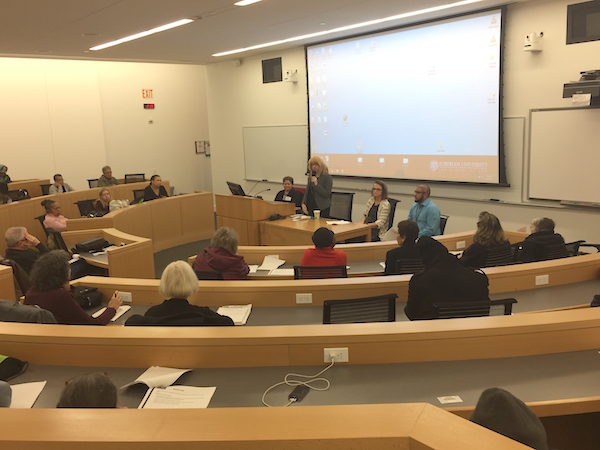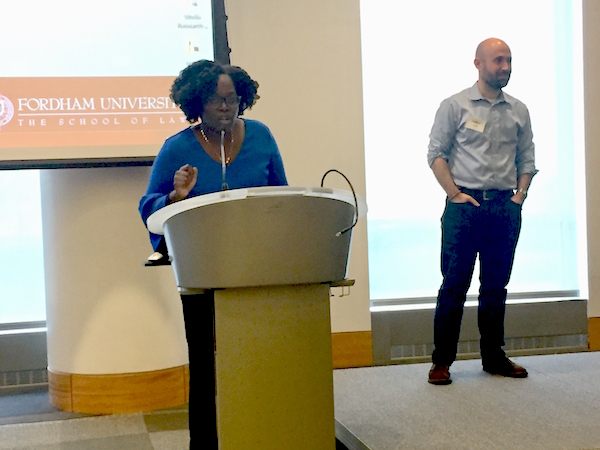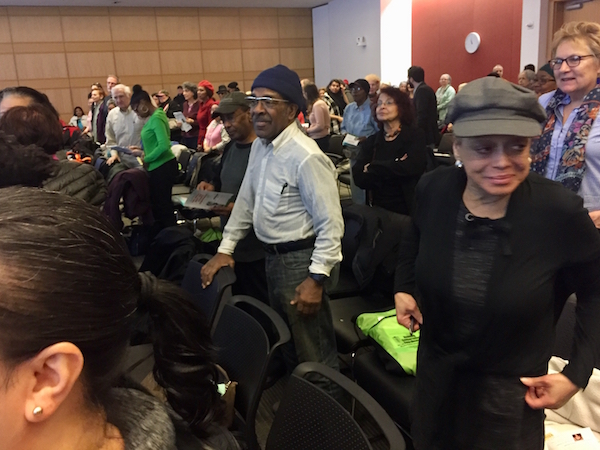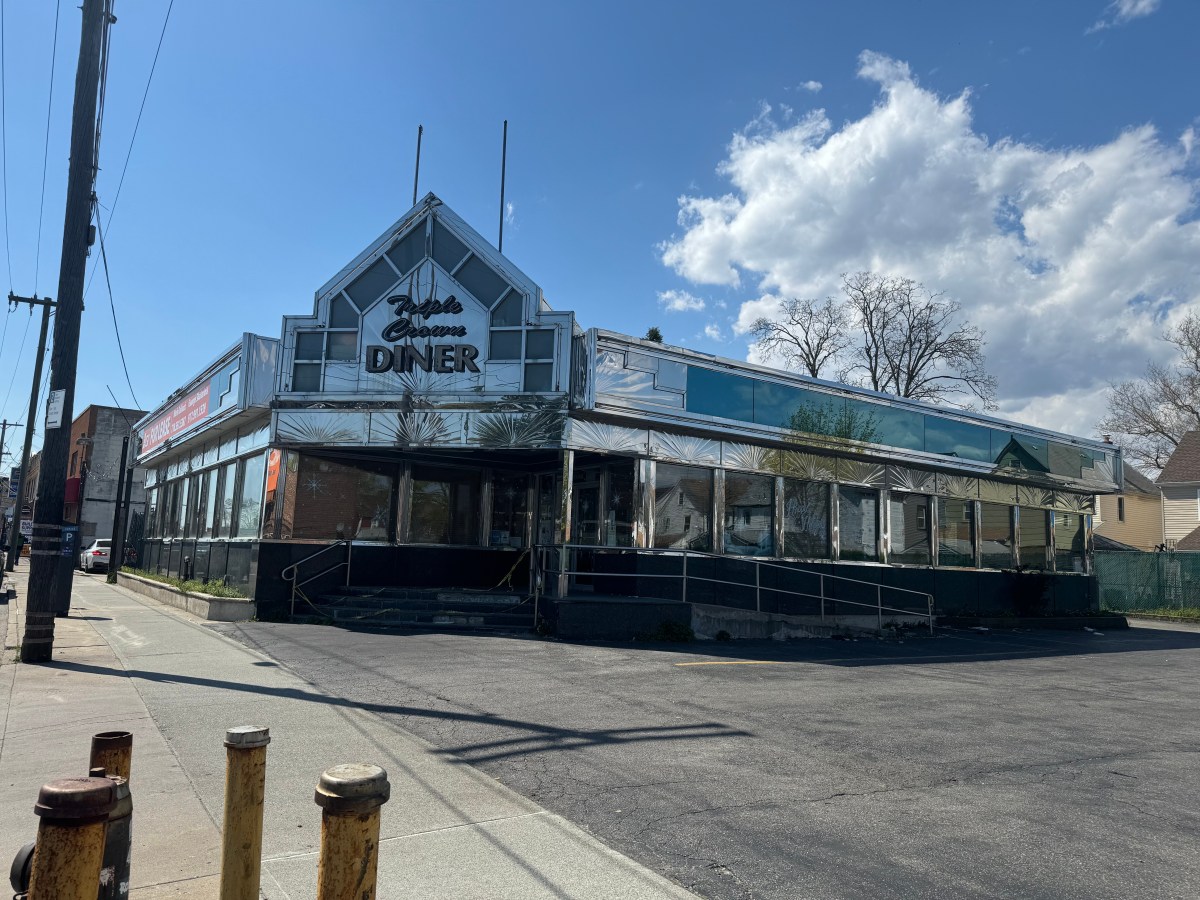
BY EILEEN STUKANE | Holes in apartment walls, rodents, and mold in buildings where tenants are paying rent on time — the sights seen by Public Advocate Letitia James made for a strong, and appropriately graphic, opening to Dec. 2’s West Side Tenants Conference. James, the producer of New York City’s annual list of 100 Worst Landlords, spoke about how even though landlords are harassing tenants in order to empty and gentrify their buildings, many victims don’t want to complain.
“They’re afraid,” she said, and the approximately 170 attendees in the hall nodded and murmured in agreement. “Today is to learn about tools, about how we can reach out and organize tenants to protect these vulnerable populations. It’s by organizing and educating that we will be able to achieve truly affordable housing.” The all-day event was all about sharing strategies for protecting and preserving affordable housing, and providing tactics to help low-, moderate-, and middle-income families survive in this increasingly expensive city.
Organized by Housing Conservation Coordinators (HCC) and the West Side Neighborhood Alliance, and supported by various businesses and community activist groups, this 12th Annual West Side Tenants Conference, which took place at Fordham University School of Law on W. 62nd St., offered morning and afternoon workshops on specific topics touching the lives of New Yorkers: zoning, obtaining affordable housing, issues of public housing, illegal hotels, senior housing and benefits, public transportation, the struggles of small businesses, immigration rights, and organizing 101 (which delved into the growing tenant movement). Experts in the field of each topic shared their knowledge and offered insights into improving individual living situations.
The tone of the day, one of shared struggle, was set by keynote speaker Afua Atta-Mensah, executive director of Community Voices Heard, a leader in a grassroots fight against the rezoning of East Harlem for residential towers and “infill” (the development of public housing property). Addressing the morning gathering, she reminded everyone that a change of attitude is needed among property owners: “People such as yourselves and your families who made this one of the greatest cities in the world, don’t just have a right to stay in the communities that you made great and hip and popular, that it’s not just something assumed but it’s loved and accepted, and of course I want a 30-year tenant in my building. That should mean something to me as a landlord, that my property is stable and safe.”

To bring about this change, she emphasized that tenants must organize across lines: “Are we more concerned about our homes or our differences? I say, my home, and that’s going to move me to go to Brooklyn, the Bronx, Staten Island, Queens, wherever the hell else I’ve got to go for my apartment and for yours.”
Atta-Mensah then asked everyone to stand and “introduce yourself to the person to your left, because the person to your left is the person you are going to be in the struggle with to protect and advance rent stabilized housing, to protect rent regulation laws. Do I have your commitment that you will stand shoulder to shoulder with the person next to you in the fight?” Her answer came in resounding applause. The fight to remain in, or to increase, affordable housing is a battle with many fronts.
OVERHAUL THE SYSTEM OF CREDIT RATING FOR TENANTS | New Yorkers who earn $50,000 or less and have poor credit because they are struggling financially come up against barriers to getting affordable housing. “That should not be,” said James. “I should not be defined by one credit score. It’s critically important that we look at other indicators to determine whether or not I can pay my rent on time.” The need to overhaul the way credit is rated was repeated throughout the conference after NYC Comptroller Scott Stringer, another morning speaker, gave details to the gathering.
Stringer explained that when wealthy people take out mortgages to buy luxury apartments, their credit scores soar as they make their mortgage payments. His office, working with nonprofit and housing organizations, has announced a plan called “Rent In Credit” to have rent payments, like mortgage payments, counted as part of an individual’s credit score. In New York City, according to Stringer, “Fifty-eight percent of residents are renters, and with ‘Rent In Credit,’ 76 percent of those renters would see their credit scores improve.” (The plan is in its infancy. At this early stage, the NYC Housing Authority has a pilot program to allow tenants to report their rent payments.)
At the “Finding and Obtaining Affordable Housing Part I” workshop, Larry Wood, director of organizing at Goddard Riverside Law Project, suggested that tenants contact the NYC Department of Consumer Affairs-Office of Financial Empowerment to seek help in improving a credit score. The website is nyc.gov/html/ofe/html/home/home.shtml. An individual can also call 311 to be connected to the department.
KNOWLEDGE IS EMPOWERMENT | The most well-attended workshops brought in people who wanted to become active in dealing with their destinies. In the Affordable Housing workshop, Wood’s information was geared toward rent-regulated housing. He admitted at the start that “A lot about finding something affordable depends upon your own homework, diligence, and perseverance.” A source sheet of Internet sites and phone numbers for NYC housing information was distributed by Wood and is available by request via his email address: larryw@goddard.org.
Daniel Arnow, Director of Affordable Housing Initiatives, The Actors Fund, spoke about NYC Housing Connect, which manages the NYC Department of Housing Preservation and Development and NYC Housing Development Corporation’s affordable housing lotteries. He reported that the city is doing a little better than anticipated in providing very low and extremely low-income housing — but middle-income housing still remains more prevalent than housing on the lower end. In conjunction with Arnow’s talk, how income is determined for eligibility for affordable housing, and how the housing lottery works, can be found on in this archived NYC Community Media article.

New York State Assemblymember Linda Rosenthal headlined the “Housing and Public Benefits for Seniors” workshop by noting that many seniors were unaware of the Senior Citizen Rent Increase Exemption (SCRIE) which allows seniors age 62 and over, who earn less than $50,000 a year and live in rent-regulated apartments, to freeze their rent if it is taking more than 30 percent of their income. She reported that “In 2016, 77,000 senior households that qualified for SCRIE had not enrolled in the program.”
Rosenthal set up clinics in her district office and passed legislation on the state level to raise awareness of the program. Now landlords are required to notify tenants once a year with their rent bill about the existence of SCRIE. When a senior tenant’s rent is frozen, the city provides the difference between what the rent legally can be and what the tenant has to pay, by giving the landlord a tax credit. The Assemblymember’s office can be contacted for information regarding SCRIE, either online via nyassembly.gov/mem/Linda-B-Rosenthal or by phone to her NYC District Office: 212-873-6368.
AND THE GOOD NEWS IS… | Jonathan T. Furlong, director of organizing at HCC, reports that coming out of the workshops, “The burning question is: ‘We want to organize our building but don’t know how to do that.’ ”
The workshop “Organizing 101” noted the new law signed in August 2017 that guarantees legal representation to low-income vulnerable tenants who face eviction, organize, and wind up in Housing Court. In addition to the new August law, in September, 12 Stand For Tenant Safety Coalition bills were passed by the NY City Council, bills that uncover landlord abuses, enforce existing policies, and protect tenants. Then in November, the City Council passed an expansion of the Certificate of No Harassment beyond the Clinton Special District. In order to sell a building, or acquire construction permits, landlords have to prove that they have not engaged in tenant harassment. The law flips the power to the tenants. The Tenant Movement is proceeding.
New York State Senator Liz Krueger reminded attendees during a lunch break that activism should also spread to the NY State Legislature, which needs more Democrats, and reunification of its existing Democrats, and there is a 2018 election cycle coming up. “We need stronger laws to protect us from illegal hoteling, to put a freeze on rent control or at a minimum, sane increases for rent control, rent stabilized apartments,” she said. “All of these could be done as free-standing bills, but you have to keep telling us. Real people in the districts we represent are being harmed. Let us know. Don’t assume we do know,” Krueger advised.
HCC’s Furlong summed up an important aspect of the conference, one that every workshop seemed to touch upon: “No matter which neighborhood you live in, you have to be concerned about what’s happening all over.”

















